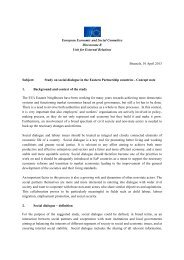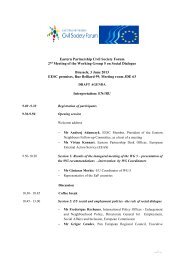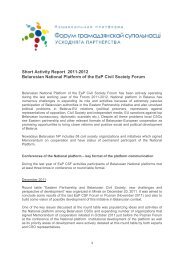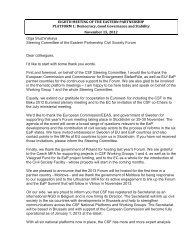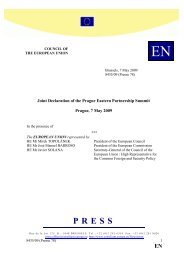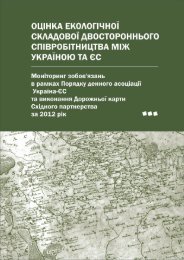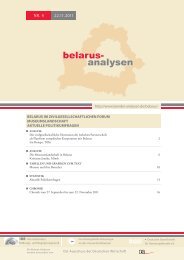Non-formal education - Eastern Partnership Civil Society Forum
Non-formal education - Eastern Partnership Civil Society Forum
Non-formal education - Eastern Partnership Civil Society Forum
Create successful ePaper yourself
Turn your PDF publications into a flip-book with our unique Google optimized e-Paper software.
NON-FORMAL EDUCATION IN UKRAINE<br />
The <strong>education</strong> system in Ukraine is undergone a constant change. Education reform has traditionally<br />
been a part of declared and ongoing innovations which take place under the banner of election to<br />
parliament and presidential elections, which are to some extent determine the political strategy of the<br />
development of the country (from the establishment of private schools to the formation of the <strong>education</strong>al<br />
process with professional competency component).<br />
The national <strong>education</strong> system started to be formed in the 1990s, when major changes in the<br />
political, social and outlook and society took place. Education has become the leader of the democratic<br />
and national values in the state.<br />
These changes were occurred in the context of the common civilizational transformation in the field<br />
of <strong>education</strong>, which have been particularly dynamic at the beginning of the twenty-first century and<br />
caused wide spread of new <strong>education</strong>al technologies, significant expansion opportunities and needs in<br />
individual and personal development of humans.<br />
And this process has led to a very wide and diverse range of <strong>education</strong>al services, new approaches<br />
to the role of <strong>education</strong> of society. There are many examples of such changes. Let us say about<br />
higher and vocational secondary <strong>education</strong>. On the one hand there was a surge in demand for higher<br />
<strong>education</strong>, which, due to a contractual form of training, it was more accessible to society, on the other -<br />
reducing the demand for blue-collar occupations, and thus, for vocational and technical <strong>education</strong>. The<br />
reasons for this situation can be seen in changes in the socio-psychological, cultural stereotypes, and<br />
awareness of the role of higher <strong>education</strong> as a criterion or a basis for changing the quality of life, etc.<br />
Over recent years, we have a tendency to return attention to vocational <strong>education</strong>. And this is due to the<br />
needs of the labor market and in Ukraine and European problems of social and economic processes.<br />
And just recently we can notice a fairly obvious trend of awareness in the Ukrainian society between<br />
<strong>education</strong>, the quality of <strong>education</strong> and received competences and quality of life. What is of greater<br />
importance, <strong>education</strong> serves as a marker of social status, in which the quality of life, material wellbeing<br />
performed not a minor, but and additional role.<br />
The specificity of the <strong>education</strong> reform in Ukraine (as, indeed, in the other countries) is its pretty<br />
clear relationship with political reforms: each new government began a new phase of work with the<br />
reform of the <strong>education</strong> system. A classic example in this context the 12-year <strong>education</strong> in high school<br />
is. Thus, the transition to a 12 - year period of <strong>education</strong> was defined in Article 12 of the Law of Ukraine<br />
On General Secondary Education 1 . In 2000 for its execution (Prime Minister Viktor Yushchenko, the<br />
Minister of Education and Science Vasyl Kremen) the government issued a decree number 1717,<br />
which, inter alia, foresaw a range of activities during 2000-2003, aimed at updating the content of<br />
general secondary <strong>education</strong> in accordance with the new structure of the school; <strong>education</strong>al plans and<br />
programs for secondary schools of different types were developed; an effective form of state attestation<br />
of school graduates was implemented, etc.<br />
But in 2010 (Prime Minister Mykola Azarov, Minister of Education, Science, Youth and Sports<br />
Dmytro Tabachnik) a decision was made and it was decided to reform the system of secondary<br />
<strong>education</strong>. Changes, which have transformed the 12-year <strong>education</strong> were added to the Law of Ukraine<br />
“On General Secondary Education” 2 : there was a rule “compulsory pre-school <strong>education</strong> for children<br />
of preschool age” (Article 16), but a full secondary <strong>education</strong> ended at grade 11. Analysis of such a<br />
reform is not a subject of the current investigation. Rather it’s one of quite striking examples of the close<br />
1<br />
http://zakon3.rada.gov.ua/laws/show/651-14<br />
2<br />
Bulletin of Verkhovna Rada of Ukraine, September,1999, № 28, p. 230<br />
74






